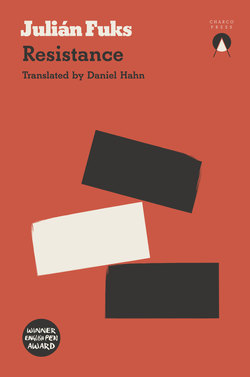Читать книгу Resistance - Julián Fuks - Страница 11
На сайте Литреса книга снята с продажи.
Оглавление5.
I walk the streets of Buenos Aires, and look at people’s faces. I wrote a whole book based on my experience of walking the streets of Buenos Aires and looking at people’s faces. I wanted them to act as my mirror, to replicate me on every corner, I wanted to discover I was Argentinian by my simple aptitude for camouflage, so that I might finally walk among equals. I never thought what it would be like for my brother to walk the streets of Buenos Aires. The uncertain anxiety that would run up his spine at every recognisable feature, every common gesture, every lingering stare, every familiar-looking face. The immense fear – or expectation – that someday a face would show itself to be his mirror, that somebody just the same really might appear in front of him, and that this same person might be replicated into so many more.
I suddenly understand, or want to understand, why my brother stopped spending time in this city that we never managed to quit. Buenos Aires is where my parents were forced to leave when he was not yet six months old, Buenos Aires is what we all felt jettisoned from as long as they weren’t allowed back – even if some of us, my sister and I, had never even set our tiny feet on its pavements. Can exile be inherited? Might we, the little ones, be as expatriate as our parents? Should we consider ourselves Argentinians deprived of our country, of our fatherland? And is political persecution subject to the norms of heredity? These questions did not arise for my brother: he didn’t depend on our parents to be Argentinian, to be exiled, to have been deprived of the land of his birth. Perhaps that was something we envied, the autonomy of his identity, the way he didn’t need to struggle so hard for his Argentinianness. He had been born there, he was more Argentinian than us, he always would be more Argentinian than us, however little that might mean. Which is why we were surprised, years later, when he stopped accompanying us on our insistent visits to the city, for the long periods in which we tried to recover the something that had, indirectly, perhaps, been stolen from us.
I walk the streets of Buenos Aires and I stop at the Plaza del Congreso, outside the headquarters of the Mothers of the Plaza de Mayo. I hesitate a moment at the door, I can’t make up my mind to go in. I’ve been there on other occasions just as a tourist or out of curiosity, I’ve run my eyes over every shelf in the bookstore, I’ve had a coffee in the gallery, I’ve let myself be imbued with its testimonials, its stories, its slogans. Now I realise I don’t want to go in, that I’m standing at the door and I don’t want to be standing at the door. That I’m standing at the door because I wish my brother were here in my place.
